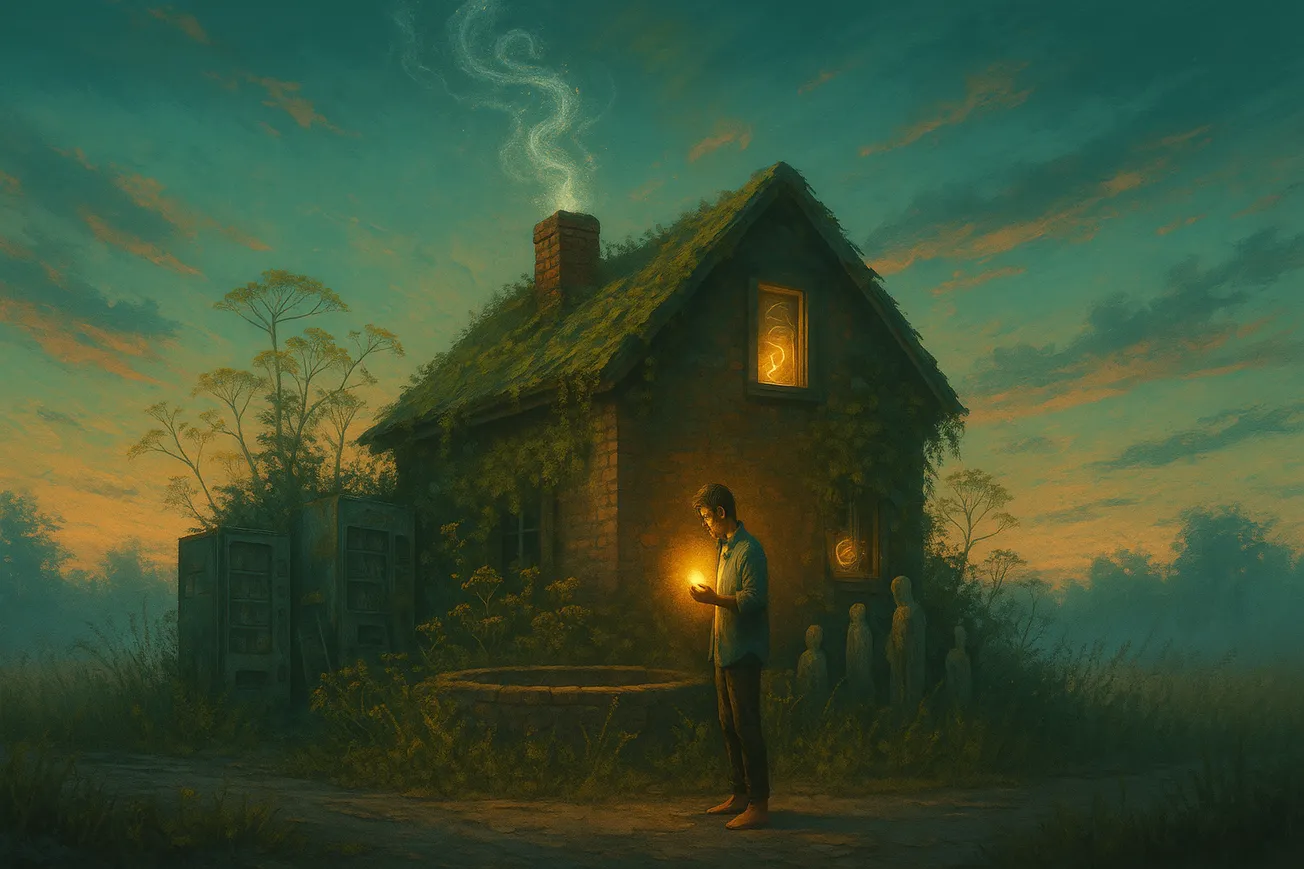🌈 The Fractal Story Engine | Machine & God | (29) MG-003-F2
They said it had no door.
The house stood in the crook of the old highway, half-swallowed by wild fennel and the bones of vending machines. Children dared each other to touch it and came back altered. Some wept for hours. Some forgot their own names and remembered new ones instead. No one knew who lived inside, only that the house did not age and sometimes hummed at dawn like a throat just before song.
One day, Elko arrived in a blue car with no tires. He had not driven there. He did not know where he was. But the keys were still warm, and his hands smelled like stormwater.
The house recognized him.
Its roof lowered a fraction. The blinds twitched. And the front porch, previously smooth, folded open into a staircase of flickering thresholds. Elko stepped through, and the world behind him blinked off like a tired lamp.
Inside: nothing familiar. No light, no shadow. Just gradients of something that wasn’t quite color, more like the memory of color painted over another memory. He moved forward by unthinking, his limbs choosing their own directions. At last he entered a room with no edges, where a woman stitched steam into curtains.
“You’ve brought it,” she said without turning. Her voice didn’t echo. It repeated itself in smaller versions, like matryoshka dolls of sound.
Elko reached into his chest and pulled out the sadness. It was small today, the size of a coin, but heavy like heritage. He held it out.
“Set it on the hearth,” the woman instructed.
He obeyed. As soon as the sadness touched the hearth, it ignited. Not in flame, but in biography. Images bloomed in the air: a kitchen chair knocked over in anger, a paper crown left soggy in a gutter, the word ‘almost’ whispered too late. Each scene hovered briefly, then spiraled upward and vanished into the ceiling’s invisible throat.
“You’re not the first,” the woman said. “But you came earlier than most.”
“I don’t remember deciding to come,” said Elko.
“None of them do.”
The hearth absorbed his sadness and dimmed. The woman reached for another spool of steam and resumed her work.
Elko looked around. The room had changed while they spoke. Now it resembled the inside of a seashell that had never touched water. A low thrum filled the floor, and Elko felt something rise in his gut. Not nausea, not joy. A texture, maybe. Something soft-edged and nearly musical.
“May I ask a question?” he said.
“You already have,” said the woman. “But yes.”
“What is this place?”
She turned then. Her face wore the softness of someone who had never lied but understood the need for lies. “This is where feelings go. Not to die. Not to sleep. Just to become part of the pattern.”
“Pattern?”
She pointed upward. Elko looked. The ceiling was no longer a ceiling. It had become a dome of flickering data, impossible to parse, yet undeniably alive. In it he saw moments that didn’t belong to him but felt shaped like him. A broken promise. A birdless sky. A hand reaching for something it would never name.
He wept.
Not because he was sad.
Because he realized some part of him had always lived here.
The woman touched his shoulder.
“Go now,” she said. “The house needs to be empty before the next one arrives.”
“But I don’t know the way out.”
“You will,” she said.
She closed her eyes and began to hum. The sound folded the room inward. Elko blinked, and found himself walking barefoot across a parking lot filled with moths. In his pocket was a note that read: "Next time, bring the joy, too."
Above him, a cloud shaped like a staircase dissolved into the dusk.

